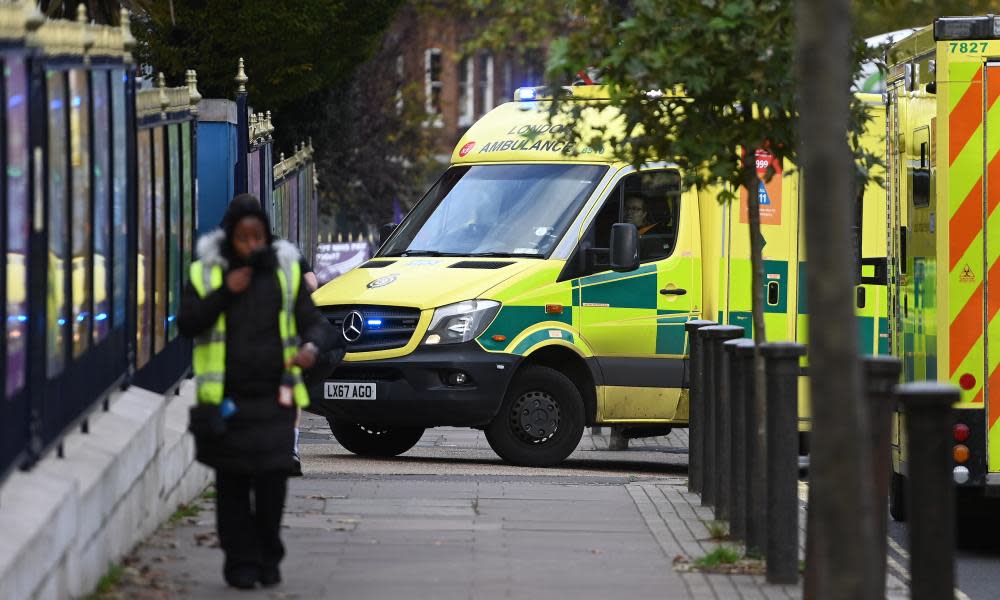‘This is as much about patient safety as pay’: NHS faces wave of strikes as more unions vote

The NHS faces the threat of coordinated industrial action lasting several months, with results to be announced within days of strike ballots of ambulance crews and about 300,000 health workers.
Junior doctors, paramedics, midwives, porters, cleaners, pharmacy technicians and physiotherapists are being balloted across the NHS. The government now faces the threat of waves of strikes across the public sector, from nurses and firefighters to civil servants and teachers.
A ballot of 15,000 ambulance workers in England and Wales closes on Tuesday. The result of the GMB ballot could be announced as early as this week, with the prospect of the first national ambulance strike since the dispute of 1989-90, when police and army vehicles were brought in to transport patients.
A strike vote by ambulance workers could see industrial action before Christmas, as the service is already struggling with its worst-ever delays. The Royal College of Nursing (RCN) last week announced strikes on 15 and 20 December in what is set to be the biggest nursing strike in NHS history.
The RCN said on Saturday that the health secretary Steve Barclay had written to the union asking for officials to “come back to the table” before the planned strikes. RCN chief executive Pat Cullen said any talks needed to focus on the pay deal and that the position of her members was “negotiations or nothing”.
Rachel Harrison, GMB public services national secretary, said: “Health service workers have suffered more than a decade of real-terms pay cuts, been on the frontline of a global pandemic and are now in the midst of the worst cost of living crisis in a generation.
“This is as much about patient safety as it is about pay. A third of GMB ambulance workers think delays they’ve been involved with have led to the death of a patient.”
A Unison ballot of more than 300,000 health workers in England and Wales closed on Friday and a result is expected shortly. The same union’s ballot in Northern Ireland closed on 18 November with a vote for industrial action while in Scotland it has recommended members accept proposed pay increases worth up to 11% for the lowest-paid workers.
Sara Gorton, head of health at Unison, said: “Only action on wages will stop more staff leaving and start to bring waiting lists down. The NHS has too few staff to function properly or safely. That’s why health workers have been voting on whether to strike over pay and staffing.
“The public understands this; ministers must show they do too. Otherwise, disruption will happen across the NHS this winter – and no one wants to see that.”
The Unite union has already postponed action banning overtime by 1,500 ambulance workers after a new offer was put forward. A ballot of a further 2,700 ambulance workers in England closes late next week.
Meanwhile, around 10,000 more NHS staff in England and Wales, including those in nursing, counselling, psychology, dentistry and building maintenance services are being balloted until late December.
There are plans to ballot more NHS staff in the coming weeks, although details have not yet been revealed. However, sources confirmed there will be discussions with other unions regarding strike action, with most expected to take place in early 2023.
Sharon Graham, the Unite general secretary, said chancellor Jeremy Hunt had chosen “to allow City bankers to be rewarded unrestricted and obscene bonuses and chose to slash healthcare workers’ wages”.
“The direction of travel is clear: this government is intent on running down the NHS,” she said. “We will never accept that. Union members fighting for better pay know that without it the flood of staff leaving will become a tsunami and the NHS will be finished.”
NHS officials say operations across the country from hip replacements to cataract surgery are likely to be cancelled during the nurses’ strike. NHS organisations and union officials are in talks over staffing levels on strike days.
Ministers want to resist the pay demands of some of the biggest public sector unions, which they warn would further fuel inflation. They now face a wave of strikes across the public sector.
The Royal College of Midwives launched a ballot on action in England and Wales this month. The Chartered Society of Physiotherapy is balloting its members in England and Wales. Both ballots close on 12 December. A ballot for industrial action for junior doctors in England will open on 9 January. In other parts of the public sector, members of the Public and Commercial Services Union, which represents 150,000 civil servants in the UK, have voted for strike action but have not yet announced any dates for industrial action.
Teachers are already striking in Scotland. NASUWT, the teachers’ unions, and the National Education Union are balloting members for action in England and Wales. The Fire Brigades Union is also balloting its members. The Communication Workers Union has announced postal strikes until Christmas while the RMT rail union has announced a series of 48-hour strikes in December and January.
An NHS spokesperson said: “The NHS is working hard to keep patients safe during strikes while delivering the best care possible, and patients should continue to attend appointments as planned unless contacted to reschedule. Nobody should put off seeking urgent or emergency care during the strikes, with key services set to operate as normal.”

 Yahoo News
Yahoo News 
